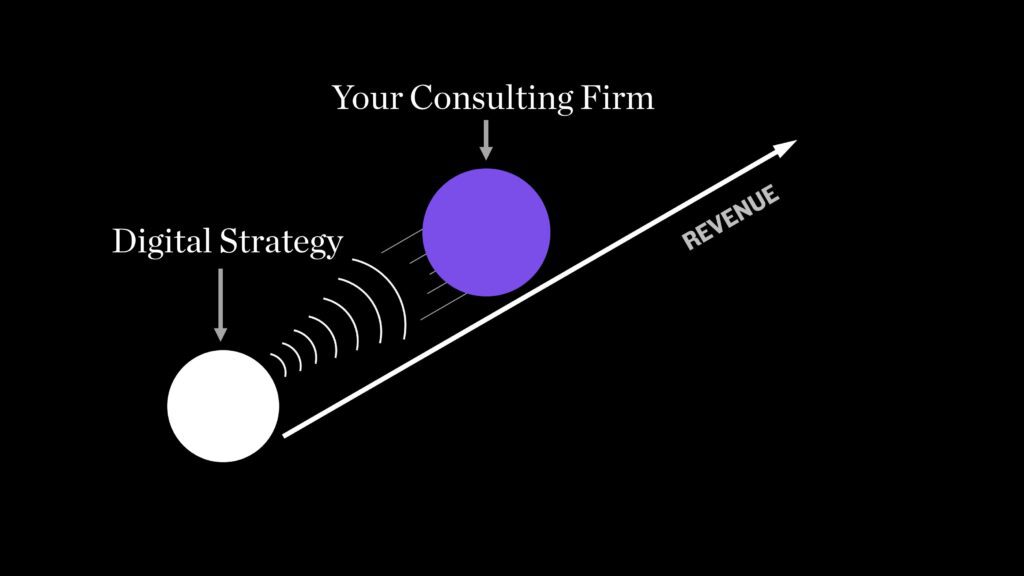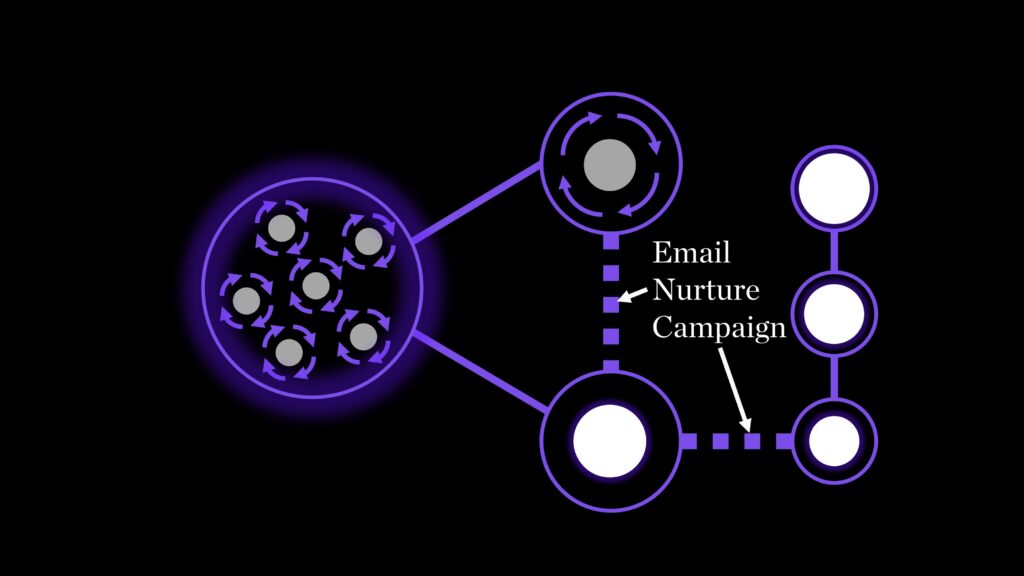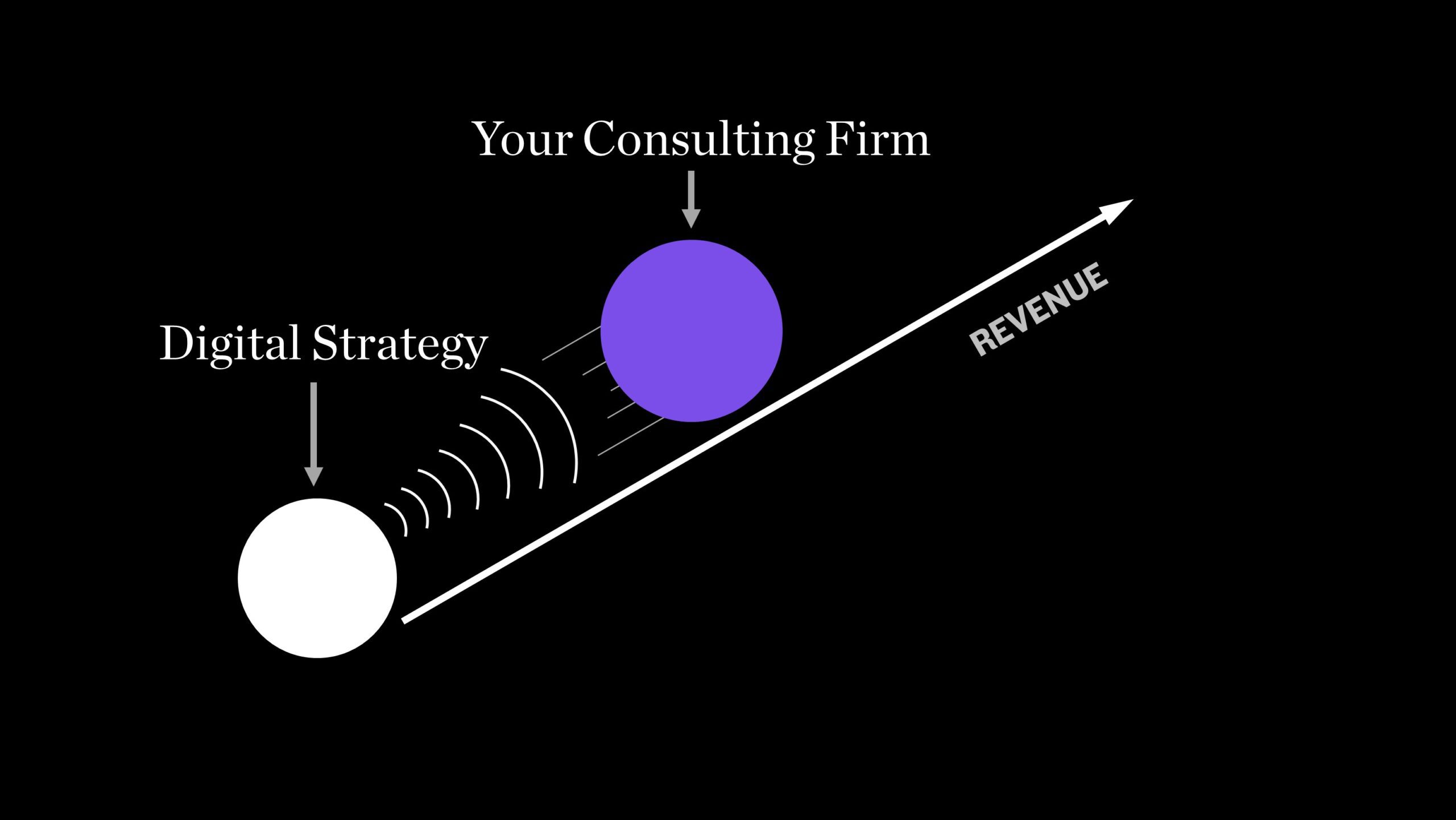Article last updated on August 14, 2023
Digital marketing strategy for consulting firms has become increasingly important as more and more businesses are turning to consultants for advice.
Personally, having seven years of experience in the consulting space, I believe the best digital marketing strategy is the one that’s tailored to the consulting firm’s specific needs.

You see, consultants possess a wealth of knowledge, expertise, and experience that can help businesses increase their profits, but they also need to be able to market themselves effectively in order to achieve success.
However, developing an effective digital marketing strategy can be a complex and overwhelming task.
With so many platforms and tactics to choose from, it’s important to have a clear plan in place to ensure that your efforts are focused and yield the best possible results.
This guide is designed to help consulting firms navigate the world of digital marketing and develop a strategy that aligns with their goals and target audience.
Whether you’re just starting out or looking to refine your existing approach, this guide will provide you with the knowledge and tools you need to succeed in the digital landscape.
Niche Expert Content Creation

If you’re an expert in a particular area, flaunt it. Create video series, podcasts, or in-depth blogs that tackle very specific problems within your niche.
This isn’t just about creating content; it’s about becoming the definitive voice in a niche area that your potential clients are grappling with.
Identify your micro-niche
Identifying your micro-niche is the first step to developing an effective digital marketing strategy for consulting firms.
Before you can begin creating content, however, it’s important to identify who you are trying to reach and what their needs are.
Your micro-niche should be based on the specific stages of life or life cycles that your target audience is in. Whether they are a merchant type, a spiritual life practitioner, an educator, a values-based individual, or something entirely different.
Once you have identified your micro-niche and the stage of life that best suits it, you can then begin targeting them with specific content that speaks to their needs.
- Research and Analyze: Identify the unique problems and pain points within your niche that haven’t been extensively covered. Utilize surveys, interviews, or social listening to uncover these.
- Define Your Expertise: Articulate what makes you the definitive voice on this subject. Credentials, experience, unique perspective? Flesh it out.
- Do Not Be Afraid to Experiment: Trying new tactics, such as launching a podcast or using social media influencers, can open up new channels of communication and introduce your brand to a whole new audience.
Expert content creation is a powerful digital marketing tool for consulting firms. It allows you to demonstrate your expertise and build trust in your brand, while also positioning yourself as an authority in the industry.
Create specialized content
Content creation is indeed the heart of the matter for many consulting firms looking to make a meaningful connection with their target audience.
Here’s a deeper, more focused exploration of content creation strategies, pulling from the wealth of insights provided:
- Videos: Creating a series of videos that address particular problems within your niche adds real value and positions you as an authority. This could include a tutorial series on how to solve specific issues, webinars, or even interviews with industry experts.
- Podcasts: Podcasting offers an engaging way to share expertise in a digestible format. If done properly, podcasts can become a powerful source of content marketing.
- In-Depth Blogs: Well-researched blogs can dive deep into complex issues, providing thoughtful solutions. Blog posts can also be broken down into smaller chunks and repurposed for social media.
- Short-form video content: If your target audience is more inclined towards short-form video content, then this could be a great avenue for you to explore. Short videos can be used to create engaging stories and capture attention.
Digital marketing for consulting firms needs to be tailored specifically to the niche that you are targeting. It’s important to identify your micro-niche, research their unique problems and pain points, articulate your expertise, and experiment with new tactics.
By creating content that speaks to the needs of your niche audience, you can demonstrate your authority and establish trust in your brand. Doing so will ultimately help you convert more leads into clients.
When you get some interest, you can send out personalized videos to wow your potential customers. This is what we’ll talk about next.
Personalized Video Responses

Instead of the usual email, imagine sending a potential client a short video that is tailored to their specific needs. It adds a personal touch and demonstrates a dedication that goes above and beyond.
In a world flooded with generic content, personalized video responses offer an innovative way to stand out.
Engaging your clients and potential clients directly through video communicates authenticity, empathy, and understanding.
This is not just about responding to queries; it’s about forging genuine connections with your audience, showing them that they are heard, understood, and valued.
- Identify Your Audience’s Pain Points: Before creating video responses, understand what bothers your clients. What are their most pressing concerns and queries? The key is not just to answer questions but to address underlying issues. Your video responses should cater to your audience’s specific needs, whether they’re an emerging startup, an established corporation, or individuals seeking personal growth and business success.
- Analyze and Respond: Tailor Your Message: Invest the time to analyze each question or concern. Provide a video response that’s not merely reactive but insightful and tailored to each individual’s unique situation and needs.
- Utilize Various Channels: Go Beyond the Obvious: Don’t just stick to one platform. Use email, social media, your website, and even direct messaging apps to deliver your personalized video responses. Meet your audience where they are.
- Humanize Your Brand: Show the Real You: Your video responses should reflect your brand’s personality and values. Be real, be yourself, and let that shine through. Scripted, corporate-speak videos won’t create the same connection.
Personalized video responses offer an unparalleled opportunity to foster trust and loyalty in the digital marketing space for consulting firms.
This tactic empowers you to rise above the noise, genuinely connect with your audience, and position yourself as not just an authority but a friend and mentor in the industry.
By embracing this approach, you’re not just talking at your audience; you’re conversing with them. You’re becoming part of their journey, part of their growth, and that is what makes personalized video responses a game-changing strategy for consulting firms. It’s more than a response; it’s a relationship.
Offer Free Tool or Software

If possible, develop a simple, free tool that your potential clients might find valuable. It doesn’t have to be complex.
Even a simple Excel tool that helps them with a common problem can position your firm as resourceful and client-centered.
In the competitive landscape of consulting, offering a free tool or piece of software isn’t just a giveaway; it’s an investment in building trust, showcasing expertise, and providing tangible value to your potential clients.
This strategy is not merely about handing out freebies; it’s about creating something valuable that solves real problems for your target audience, drawing them closer to your brand.
- Identify the Gap: What’s Missing? The first step in offering a free tool or software is to identify a gap in the market. What are the challenges that your target audience (e.g., entrepreneurs, educators, or values-based individuals) is facing that haven’t been met by existing solutions?
- Design with Purpose: Solve Real Problems: Develop a tool or software that addresses these specific challenges. It must be practical, user-friendly, and purpose-driven. Whether it’s a financial modeling tool for startups or a self-assessment software for personal growth, it must resonate with your audience’s needs.
- Educate and Support: Go the Extra Mile: Provide comprehensive guides, tutorials, or webinars to help your audience utilize the tool effectively.
- Gather Insights: Learn from Your Users: Encourage feedback and track user behavior within the tool. This can provide invaluable insights into your audience’s real needs and preferences, allowing you to refine your offerings and deepen your understanding of your market.
Offering a free tool or software is a multifaceted strategy that goes beyond a simple giveaway.
It is a symbol of your expertise, a demonstration of empathy for your audience’s challenges, and a commitment to providing real value.
Here are some practical ideas for tools or software that consulting firms could offer. Each of these caters to specific needs and would align well with different areas of expertise:
- ROI Calculator: Helps clients determine the potential return on investment for various projects or marketing campaigns. Tailor it to specific industries or strategies for added value.
- Financial Health Assessment Tool: Designed for businesses to assess their financial stability, cash flow, debt ratio, etc. Offer personalized reports with actionable insights.
- Market Trend Analyzer: Allows users to track and analyze market trends in specific industries. Great for strategic planning and competitive analysis.
- Personal Growth Tracker: For coaches or personal development consultants, this tool can help individuals track progress in various areas of personal growth, such as leadership skills, emotional intelligence, etc.
- Sustainability Audit Tool: Helps businesses assess their environmental and social impact. Could be particularly valuable for consultants focused on corporate social responsibility.
- Compliance Checker: For legal or regulatory consultants, a tool that helps businesses identify potential compliance issues in specific jurisdictions or industries.
- Employee Engagement Survey Tool: A customizable survey tool to assess employee satisfaction, engagement, and organizational culture. Provide analysis and recommendations based on the results.
- Content Strategy Planner: For marketing consultants, a tool that helps businesses plan and track their content marketing strategy, including keyword planning, editorial calendars, and performance metrics.
- Supply Chain Evaluator: Assists in mapping and evaluating supply chain efficiency, identifying bottlenecks, and suggesting improvements.
- Customer Persona Builder: This tool helps businesses create detailed customer personas for more targeted marketing and product development. Guides users through the process, providing tips and examples.
- Competitor Analysis Dashboard: This allows businesses to track and analyze competitor performance across various metrics, making it easier to identify opportunities and threats.
- Time Management App: For productivity consultants, an app that integrates proven time management methodologies tailored for specific professions or industries.
- Crisis Management Simulator: A tool that allows companies to run virtual scenarios to test their crisis management plans. Provides feedback and recommendations for improvement.
- Ethical Business Assessment: A self-assessment tool that helps businesses evaluate their ethical practices and alignment with values-based leadership.
- Innovation Idea Generator: A brainstorming tool that uses AI to help teams come up with innovative ideas based on input parameters and industry trends.
Remember, the key to a successful tool is not just its functionality but also how it aligns with your brand, your expertise, and the real needs of your target audience.
Each tool should be accompanied by educational resources to help users understand and maximize its value. By doing so, you’re not just offering a free tool; you’re offering a piece of your expertise, wrapped in a package that can bring real, tangible benefits to your clients.
For consulting firms looking to establish authority and build long-term relationships, this strategy can be a powerful conduit for engagement and loyalty.
Now let’s talk about something that most experts know but hide away: the use of AI to grow your business.
AI-Driven Personalization on Your Website

In the rapidly evolving digital landscape, AI-driven personalization is more than a trend; it’s a necessity.
By harnessing the power of artificial intelligence, you can deliver content, offers, and experiences tailored to individual users’ needs and preferences on your website.
This is not just about serving personalized ads; it’s about creating an entire ecosystem where every interaction is meaningful and resonates with what your visitors are looking for.
- Identify Your Users’ Behavior and Preferences: Understanding your audience is paramount. Analyze their behavior, preferences, previous interactions, and even their stage in the buyer’s journey. AI can help you dissect this complex data quickly and efficiently.
- Implement and Optimize: Tailor the User Experience: Utilize AI algorithms to deliver personalized content, offers, recommendations, and even navigation on your site. This isn’t about a one-size-fits-all approach; it’s about crafting a unique experience for each visitor.
- Test and Learn: Continuously Evolve: AI-driven personalization requires ongoing refinement. Regularly test different approaches, learn from the results, and iteratively improve your strategies to stay relevant and effective.
AI-driven personalization offers endless opportunities for creating a unique and engaging experience for each visitor. Here’s a more detailed look at the examples you mentioned and some additional ones:
- Visitor’s Geo-Location:
- Tailoring content, offers, or promotions based on the visitor’s location.
- Displaying location-specific testimonials or case studies.
- Adjusting language, currency, or regional preferences based on location.
- Personalized Name on Landing Page:
- Addressing returning visitors by their first name or surname, making the experience more intimate and engaging.
- Providing personalized recommendations or insights based on previous interactions.
- Personalized Video:
- Creating videos that are tailored to individual user preferences, behaviors, or stages in the buyer’s journey.
- Offering video content that addresses specific questions or concerns based on user interactions.
- Behavior-Based Personalization:
- Offering product or service recommendations based on previous purchases, searches, or interactions.
- Tailoring content, such as blogs or tutorials, based on past behavior.
- Customized Navigation and User Journey:
- Adapting the site’s navigation and content flow based on what is most relevant to the individual visitor.
- Guiding users through a personalized journey that aligns with their needs and interests.
- Personalized Support and Chatbots:
- Offering personalized support through AI-driven chatbots that understand and respond to individual needs.
- Providing relevant FAQs or support content based on previous interactions or issues.
AI-driven personalization on your website is a powerful tool in the toolkit of a digital marketing strategy for consulting firms.
It transcends mere customization, providing a highly intuitive and resonant user experience that can significantly impact engagement and conversion.
By embracing this strategic approach, you’re not just following a trend; you’re leading it. You’re demonstrating a commitment to understanding, valuing, and serving your clients in a way that is both innovative and deeply personal.
It’s a forward-thinking strategy that not only positions you as a leader in the field but also fosters genuine connections and trust with those you serve. It’s technology with a human touch.
Interactive Webinars and Workshops

Interactive webinars and workshops aren’t just about disseminating information; they’re about creating immersive learning experiences that engage, inspire, and transform.
These platforms provide a golden opportunity to showcase your expertise, interact with your audience in real-time, and provide tangible value that sets you apart from the competition.
Tap Into Your Audience’s Needs and Desires: The success of webinars and workshops hinges on meeting the actual needs and desires of your audience.
- Understand what they’re struggling with.
- What do they want to learn or achieve?
- Craft your webinars and workshops around these insights.
Design Engaging and Immersive Content: A well-structured and engaging webinar or workshop can be a game-changer.
- Include live Q&A sessions, polls, quizzes, and interactive tasks.
- Utilize visuals, storytelling, and real-world examples to make content relatable and absorbing.
Provide Value-Added Material: Offering additional resources can extend the learning and engagement beyond the session.
- Provide downloadable guides, templates, or toolkits.
- Include follow-up emails with additional insights or exclusive offers.
Consulting firms have a plethora of opportunities to craft webinars or workshops that address specific needs, challenges, and interests in their industry.
Here are some tailored ideas that could skyrocket engagement and value:
- Strategic planning and goal setting
- Leadership development and team building
- Industry-specific insights and trends analysis
- Digital transformation and technology adoption
- Client relationship management (CRM) best practices
- Marketing and sales optimization techniques
- Diversity, equity, and inclusion initiatives
- Cybersecurity awareness and best practices
- Sustainability and corporate social responsibility
- Entrepreneurship and startup guidance
- Innovation and creativity in business
- Financial management and budgeting strategies
- Remote work and virtual collaboration skills
- Emotional intelligence and communication in the workplace
- Project management and agile methodologies
- Negotiation skills and conflict resolution
- Ethics and compliance in business practices
- Customer experience and service excellence
- Human resources and talent management strategies
- Product development and design thinking
These topics offer a wide range of possibilities to connect with various segments of your target audience, helping you showcase your expertise, address specific challenges, and provide actionable insights.
By selecting and tailoring these subjects, consulting firms can create compelling and valuable webinars or workshops that resonate with their clientele.
It’s a relationship-building strategy that transcends mere information sharing, creating an interactive experience that resonates with your audience. It’s about connecting, growing, and inspiring together, turning prospects into partners, and clients into collaborators.
In the world of consulting, it’s not just about knowing more; it’s about doing more, and interactive webinars and workshops can be your catalyst for growth.
VIP Customer Experience for Repeat Purchases

Customer retention is as vital as acquisition; providing a VIP experience for repeat clients isn’t just a courtesy; it’s a strategic imperative.
This isn’t about empty flattery; it’s about genuinely appreciating the clients who continue to believe in your consulting firm’s value.
- Tailor Exclusive Offers: A VIP experience means more than a one-size-fits-all discount. It’s about crafting offers, experiences, or services exclusively for them. Whether it’s early access to new services or personalized consulting hours, make them feel special.
- Make It Direct and Sincere: Generic emails won’t do. Communicate personally, using first names, referencing past interactions, and showing that you remember and value the relationship. Regular check-ins that are thoughtful and not sales-driven can make a significant difference.
- Create a VIP Portal: Consider creating an exclusive online portal or community for VIP clients. Offer them unique content, exclusive webinars, or forums where they can connect with like-minded individuals or even with your firm’s experts.
- Celebrate Milestones: Whether it’s the anniversary of their first contract with you or a key business milestone they’ve reached, celebrating these moments shows attentiveness and appreciation.
VIP Customer Experience is about the details, the thoughtful gestures, the exclusive offers, and most importantly, the authentic appreciation of repeat clients in your consulting firm.
It builds loyalty, encourages word-of-mouth referrals, and fortifies your reputation as a firm that doesn’t just value business but values people.
By prioritizing and personalizing the experience of your repeat clients, you’re sending a clear message that their faith in you is not taken for granted; it’s celebrated and nurtured.
This isn’t just a strategy; it’s the embodiment of authentic customer care that resonates with those who seek meaningful business relationships. It’s not about treating them as VIPs; it’s about making them feel like part of the family.
Double Down on Email Marketing

Email marketing remains a powerful and personal way to reach your audience. It’s not about flooding inboxes with promotions; it’s about crafting targeted, valuable, and engaging content that resonates.
When someone becomes a lead or client, it’s not enough to stop there. It’s about continuously engaging them through personal emails and effective campaigns that establish communication and nurture relationships.
Below is an example of a five-part email sequence that a consulting firm might use to engage a specific segment of their audience, such as new subscribers or potential clients who’ve shown interest in a particular service.
Example of email sequence for consulting firms:
| Subject | Content | |
|---|---|---|
| Email 1: | Welcome to [Firm’s Name] – Let’s Start Your Success Journey! | Warm welcome, brief introduction of the firm’s expertise, understanding the challenges faced by the subscriber. Free resource or insight relevant to interest. Soft CTA, like asking what they’re struggling with most. |
| Email 2: | Solving [Specific Problem] – Our Proven Strategies | Dive into a specific problem resonating with the audience segment. Share insights, a case study, or short success story. Include a CTA to a related blog post or video. |
| Email 3: | We Want to Hear from You – Your Goals & Challenges | Encourage subscribers to share specific needs or challenges. Provide personalized response or direct them to a relevant resource on your site. Make them feel heard and understood. |
| Email 4: | Unlock Success with Our Exclusive [Service/Tool/Resource] | Offer exclusive service, tool, or resource aligning with their needs. Create urgency with a limited-time offer. Guide to the next step, whether it’s a discovery call, purchase, or another engagement. |
| Email 5: | How [Client’s Name] Transformed Their Business with Us | Share a compelling client success story or testimonial relevant to their challenges. Include a strong CTA for a free consultation or a personalized assessment of their needs. |
Key considerations:
- Personalization: Use the recipient’s name and tailor content based on their interactions and behavior.
- Timing: Space out these emails over a week or two, monitoring response and engagement.
- Responsive: Be prepared to engage personally if recipients respond with questions or needs.
This email sequence is designed to take a potential client on a journey from initial awareness and trust-building to consideration and engagement with your consulting firm’s services.
It emphasizes understanding, expertise, authenticity, and value – core elements that resonate with businesses looking for a consulting partnership.
By aligning the sequence with your audience’s specific needs and stage in their journey, you create a path that feels personal, insightful, and geared towards their success.
Frequently Asked Questions
After reading the information provided above, you may still have some questions regarding digital marketing strategies for consulting firms.
In this section, we aim to address some of the most common inquiries and provide expert advice on this topic. Let’s explore the frequently asked questions:
What are the essential elements of a digital marketing plan for a consulting business?
The essential elements of a digital marketing plan for a consulting business are strategy, goals, target market, budget, and tactics.
Every consulting firm should begin by developing an effective strategy that aligns with their desired outcomes and the nature of their services.
Once you have determined your strategic direction, it is necessary to clearly identify your marketing goals and develop a realistic budget accordingly. Knowing who your ideal clients are is also essential.
Finally, you should implement the right digital marketing tactics to help you reach your target market and achieve your goals.
What role does search engine optimization (SEO) play in a marketing effort for a consultancy firm?
Search engine optimization (SEO) is an integral part of any digital marketing strategy for a consulting business.
By optimizing your website content, as well as using other SEO strategies such as link-building and keyword research, you can ensure that your firm appears higher in relevant searches.
This visibility can help attract qualified prospective clients to your site and ultimately convert them into paying customers.
How can social media marketing boost client acquisition for digital marketing consulting services?
Social media marketing can be an incredibly powerful tool for digital marketing consulting services looking to increase client acquisition.
With the right strategic approach, firms can leverage the power of social media to engage with their target audience and expand their reach.
When done correctly, social media campaigns can drive meaningful interactions with potential clients, encourage website visits, and generate leads that result in increased business. To achieve the best results, it is important to select the right platforms, use relevant and powerful visuals, create well-crafted messages, and track performance.
Why are social media channels vital to inbound marketing for marketing consulting firms?
By engaging with their audience on social media, firms can position themselves as thought leaders in the industry and establish trust through meaningful connections.
Social media channels are invaluable for inbound marketing for consulting firms. With the right approach, they can help nurture leads and convert them into paying customers.
By using targeted ads and creating content tailored to their target audience, companies can establish relationships with potential clients that lead to long-term customer loyalty.
Additionally, social media offers valuable insights into consumer behavior and trends, allowing companies to deliver more relevant offers and better meet the needs of their clients.
What marketing approach should consulting firms adopt for rapid business growth?
For consulting firms looking to rapidly grow their business, a comprehensive marketing approach is essential.
If you follow the guide provided here, you should be able to develop an effective digital marketing plan that allows you to reach your goals.
The most important step is to determine your target market and develop a marketing message that resonates with them.
Once you have established a clear strategy, you can then create content and promotional materials to reach your target audience, track your performance with Google Analytics, and use effective online marketing tools such as email campaigns and social media advertising.
How can networking events be integrated into the digital marketing services of a consulting firm?
Networking events can be a powerful tool for the digital marketing services of a consulting firm.
They provide an opportunity to build relationships with potential clients, establish credibility and trust, create awareness of your services, and spread the word about your business.
When attending networking events, it is important to make sure that you are prepared – have your elevator pitch ready and well-crafted business cards in hand.
Additionally , you should use the opportunity to listen to and learn from other professionals in the industry and ask questions that show your interest in their work.
Make sure to follow up with any contacts you made at the event via email or social media so you can continue to stay connected.
What are some effective digital marketing channels for consulting firms to utilize?
For consulting firms looking to make the most of their digital marketing services, YouTube or SEO should be at the top of the list.
Video content is a powerful tool for connecting with potential customers. YouTube is the second-largest search engine in the world and can drive meaningful engagements with your target audience, as well as promote your services, and encourage website visits.
SEO is also a valuable digital marketing tool for firms looking to increase organic traffic to their website. By optimizing content with targeted keywords, consulting firms can make sure their website is visible to the right people.
In addition to YouTube and SEO, other digital marketing channels such as social media, email campaigns, and content marketing should also be considered for a comprehensive approach.
Are there any specific tips for creating engaging content for consulting firms in the digital space?
If you listen to your target audience and create content that resonates with them, you should be able to create engaging content for your consulting firm in the digital space.
You will notice a pattern of topics that are popular amongst your target audience, and you should use this insight to develop content that is informative, entertaining, and relevant.
It’s also important to remember the importance of storytelling when creating engaging digital content – stories can be an effective way to share information about your firm in a captivating way.
Conclusion
Developing a strong digital marketing strategy is crucial for consulting firms to thrive in today’s competitive landscape.
By focusing on key components such as targeting the right audience, utilizing effective channels, measuring success, and creating engaging content, consulting firms can establish their online presence and attract potential clients.
Additionally, leveraging social media platforms can further enhance a consulting firm’s digital marketing strategy by allowing for increased brand visibility and engagement.
It is important for consulting firms to continuously adapt and refine their digital marketing efforts to stay ahead in the ever-evolving digital landscape.
With the right expertise and implementation, a well-crafted digital marketing strategy can greatly contribute to the success and growth of consulting firms. If you have any further questions or need personalized advice, feel free to reach out.


